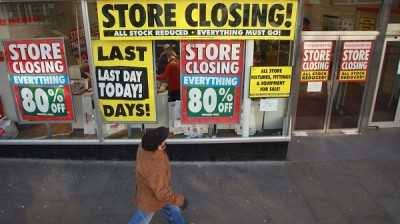The ‘death of the high street’ is a phrase that has dominated the public consciousness of late. News pundits, politicians, and steadfast taxpayer Mike Ashley have all expressed alarm at the grim future facing Britain’s crashing retail sector. And rightfully so, because on the face of it, the internet is killing stores. Or, more specifically, Amazon is. Having just enjoyed a record (if undisclosed) number of items sold last Christmas, as well as millions of brand new Amazon Prime subscribers, it is hard to imagine how the likes of HMV could have ever hoped to compete with the online-only colossus.
Indeed, HMV’s inevitable lapse into administration last month echoes (or should that be ‘Amazon Echoes’?) the recent decline of such high street pillars as House of Fraser, Poundworld, and Debenhams, which strongly denies being on the verge of insolvency. Tesco, the de facto market leader amongst the ‘Big Four’ supermarkets is looking decidedly less healthy than in years past, making swathes of job cuts in order to save £1.5bn on operating costs.
But is this entirely a bad thing? Labour certainly seems to think so, promising free Wi-Fi in city centres in order to encourage shoppers to stick around for longer, as well as scrapping ATM charges to ensure they get every opportunity to spend more cash. After all, reviving the high street means curbing unemployment, which is always a sore spot for voters. Naturally, the party places blame squarely at the foot of Conservative-led austerity, which has massively reduced government spending – and investment – over the past decade.
It is therefore worth noting that both parties’ plan to restore the retail sector potentially involves more austerity. Phillip Hammond, the Chancellor of the Exchequer, has ‘strongly considered’ implementing an ‘Amazon tax’ on online retailers, in a decidedly un-Conservative move that has garnered support from Tesco’s CEO. This is in response to Amazon’s longstanding history of exploiting financial loopholes to avoid paying most or all of its corporate tax. However, it isn’t terribly clear how exactly this is going to save retail stores, or whether it’s just another stream of government revenue.
Operating out of warehouses rather than physical shops is a large part of Amazon’s ‘disruptive’ business model, which has allowed it to undercut its competition and amass market superiority at minimal cost. Its greatest sin, then may be innovation, with traditional retailers having no one to blame but themselves. Certainly, any additional tax on them is likely to be passed onto the consumer, as Amazon increases their prices to compensate. Is a bailout even deserved, when stores have been unable to face up to modern challenges like rising business rates, low-cost German competitors, and the ever-present uncertainty of Brexit?
Regardless of where the blame lies, the consumer has already made their choice: online shopping is the way forward. High street retailers will be forced to shake up decades-old business practices, or succumb to the inexorable tide of online vouchers and free next-day delivery.
Unless they’re John Lewis, that is.

